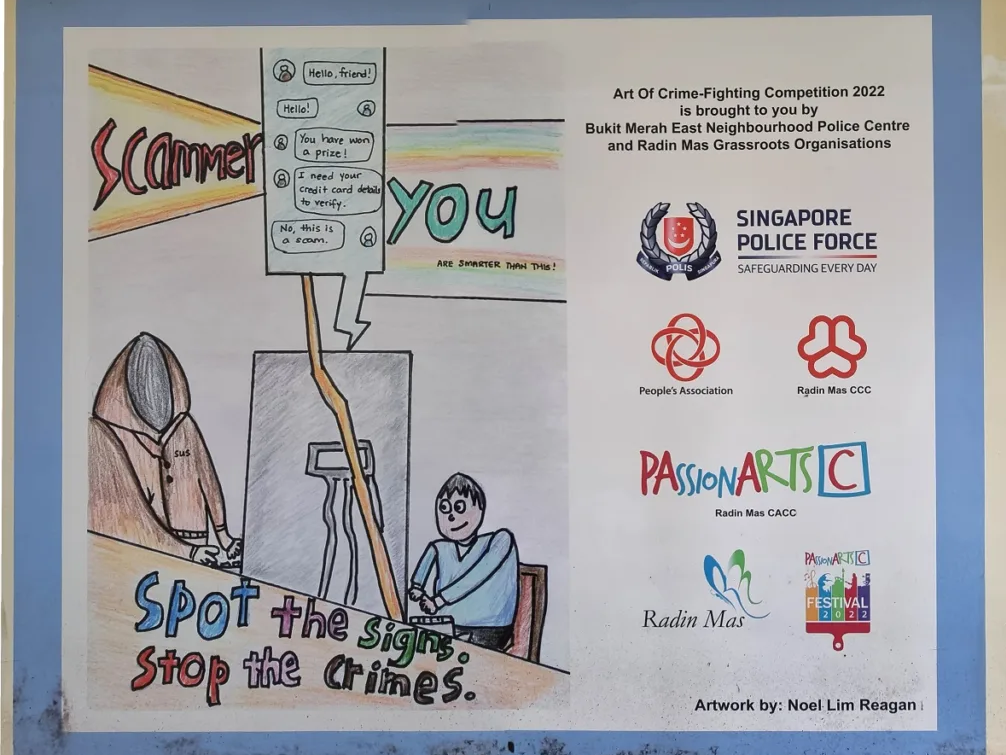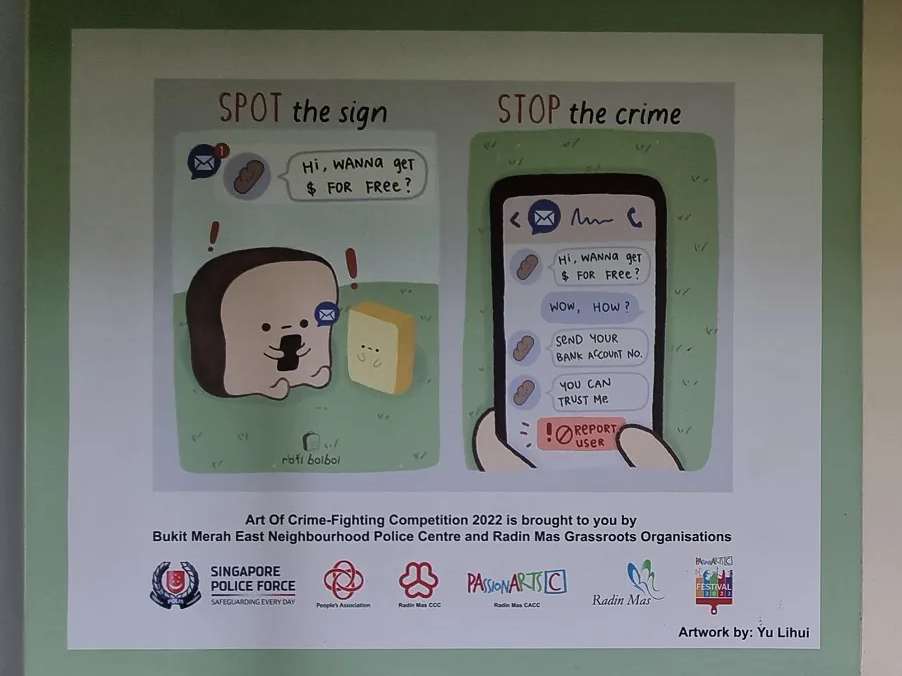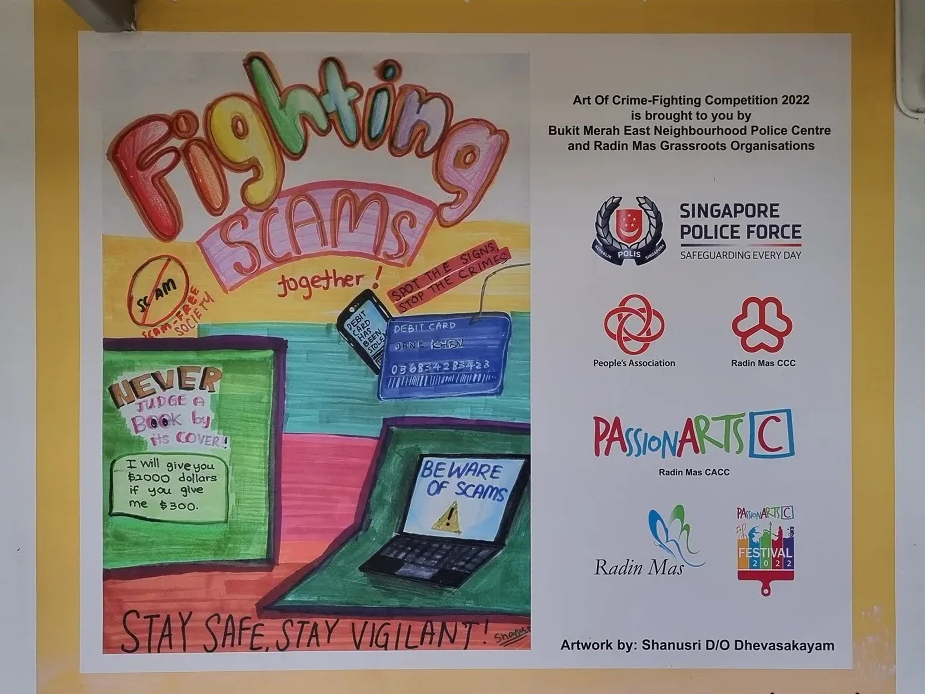
Types of scams
Scams are becoming more sophisticated. Learn how to protect yourself from common scams such as phishing, phone scams, and travel scams
Romance/Dating Scams
1. Online Romance Scams
Methods:
- Fake Profiles: Scammers create attractive profiles on dating apps (e.g., Tinder, Facebook Dating) using stolen photos.
- Emergency Requests: After gaining trust, they claim to need money for medical bills, travel, or legal issues.
- Investment Romance Scams: Combine fake relationships with fake investment opportunities (e.g., cryptocurrency).
Prevention:
- ✅ Verify identities via video calls.
- ❌ Never send money to someone you haven’t met in person.
Case:
- Singapore police bait credit-for-sex scammer to expose their scare tactics. Source
- Victims of credit-for-sex scams lose at least $402,000 since January 2022. Source
- Woman siphoned $1.3m from 2 firms to claim parcel from scammer. Source
- Singaporean men in naked web cam extortion scam. Source
- Woman nearly loses US$5,000 in online love scam. Source
- Sibu woman loses RM86,841 in love scam after meeting ‘oppa’ on Tinder. Source
- Love scam victim with special needs waited in vain at Tanah Merah Ferry Terminal for ‘girlfriend’. Source
- Singapore actor Laurence Pang loses $35k to scam after meeting woman on Filipino dating site. Source
- A Singaporean woman on a solo trip to Taiwan came close to losing NT$30,000 to a love scammer she first befriended on a dating app. Source
- 7-year love scam costs Malaysian woman nearly US$500,000. Source

2. Offline Romance Scams
Methods:
- Sweetheart Scams: Scammers befriend seniors in person, then borrow money for fake emergencies.
- Fake Marriages: Fraudsters propose marriage to steal dowry or immigration fees.
Prevention:
- ✅ Involve family/friends before making financial decisions.
- ❌ Avoid sharing financial details with new acquaintances.
Case:
- Indonesian sex scam: Batam scammer Rasmi Sinaga and accomplices. Source
- Indonesian Dating Scams: Things to Know and Protection. Source
- Couple Arrested for Mutilating Man in Jakarta. Source
- Man claims masseuse at Ang Mo Kio massage parlour made him gift her non-stop. Source
- Woman admits to cheating 70-year-old man. Source
- The female boss keeps a 27-year-old male model by 30,000 per month. Source


Impersonation Scam
1. Impersonation of Government Officials
Methods:
- Online: Fake calls/SMS/emails claiming to be police, tax agencies, or health departments, threatening legal action or fines.
- Offline: Scammers visit homes with forged IDs to demand payments (e.g., “tax arrears”).
Prevention:
- Verify via official hotlines (e.g., Singapore Police: 1800-255-0000).
- Never share NRIC or bank details over unsolicited calls.
Case:
- Be wary of scammers posing as Singapore govt officials, say police. Source
- $2.6 million lost to scammers posing as MAS officers since start of 2023. Source
- S’pore police warns of phone scammers impersonating MDDI government officials. Source
- Scammers claiming to be officers from the police’s Anti-Scam Centre (ASC) caused a woman to lose $1.2 million over the course of two months. Source
- The Ministry of Defence (Mindef) has warned the public about the presence of fake recruitment messages related to its hiring of former Singapore Armed Forces. Source
- Victims lose over $133k in scam linked to unpaid LTA fines, more than 100 police reports filed. Source
- Public warned of scammer spoofing call from ICA Call Centre number. Source
- How a retiree lost $200k to scammers who posed as cops. Source
- Advisory on Phone Scam Involving Court-Directed Process. Source
- Scammers targeting people in S’pore weave Covid-19 vaccines, MOH into their false narratives. Source
- When told by a “police officer” that she might be implicated in money laundering, a woman feared she would be dragged into the $3 billion case. Source
2. Impersonation of Bank Staff
Methods:
- Online: Phishing SMS/emails with fake bank links to steal login credentials.
- Offline: Fake bank staff offering “account upgrades” to steal card details.
Prevention:
- Banks NEVER ask for OTPs. Use official apps and enable 2FA.
Case:
- OCBC says S$13.7 million lost in phishing scams, up from S$8.5 million. Source
- S’pore widow, 60, allegedly loses almost S$55,000 to phone scammer impersonating DBS staff. Source
- At least 83 victims have lost $155,000 in DBS phishing scam since the start of January 2024. Source
- After receiving a text message about possible fraud seemingly from her bank, HSBC, she promptly responded.. Source
3. Impersonation of Celebrities
Methods:
- Online: Fake social media accounts offering “exclusive meetups” for payment.
- Offline: Fraudulent charity events using celebrity names to collect donations.
Prevention:
- Verify accounts via blue verification ticks on social media.
Case:
- The Squid Game “meme coin” debacle shows—again—why India badly needs crypto regulation. Source
- Pahang palace warns of fake Tengku Afzan TikTok account offering ‘Ramadan aid’. Source
- Woman exposes catfish claiming to be Singapore actor Desmond Tan. Source
4. Impersonation of Other Individuals
Methods:
- Online: Fake “family emergencies” (e.g., “I’m stranded abroad, send money!”).
- Offline: Scammers pose as delivery staff to collect “processing fees”.
Prevention:
- Confirm urgent requests through direct contact with family or official channels.
Case:
- At least $1.7 million had been lost since January in six cases involving scammers who baited their victims with supposedly outstanding insurance premiums. Source
- S’pore woman, 37, gets scam call posing as NTUC & MAS staff, loses over S$1.14 million in 4 hours. Source
- S’porean retiree loses life savings in scam by fake Facebook friend. Source
- Woman loses $67k after believing scammer’s lie that she wrongly bought WeChat ‘anti-scam insurance’. Source
- More than S$750,000 lost to scammers pretending to be Shopee employees. Source
- Phone call from man posing as DHL worker led company’s MD to start anti-scam campaign. Source
- AI clones teen girl’s voice in $1M kidnapping scam: ‘I’ve got your daughter’. Source
- At least 59 victims have lost $1.4m since January 2024 to tech support scam. Source
- How a senior IT exec fell for a ‘technical support’ scam and nearly lost S$180,000. Source
- How to Avoid Orphanage Scams When Volunteering Abroad. Source
- Singaporean makes police report claiming old man “hypnotised” him into giving him all the money in his wallet. Source
- SP Services is latest to warn of phone scam. Source

Investment Scams
1. Fake Cryptocurrency/Forex Platforms
Methods:
- Online: Fraudulent websites/apps mimicking legitimate platforms, promising “guaranteed high returns” with fake celebrity endorsements.
- Offline: High-pressure seminars promoting “risk-free” forex or crypto investments.
Prevention:
- ✅ Verify platforms via regulators (e.g., MAS in Singapore, SC Malaysia).
- ❌ Avoid “get-rich-quick” promises.
Case:
- 400 suffer losses of more than RM100mil in forex investment scheme. Source
- Medical Officer Loses Over RM86,000 To Cryptocurrency Scam. Source
- 90-Year-Old Woman Loses $500,000 to ‘Friends’ Who Claimed Cryptocurrency Investment Failures. Source
- Be Aware of Illegal Investment Offers & Online Scams in Indonesia. Source
- Boss cheated out of 4.3 million yuan by AI face-changing fraud. Source
2. Fake Stock/Land Investments
Methods:
- Online: WhatsApp/Telegram groups sharing fake “insider tips” on stocks.
- Offline: Brokers selling shares in non-existent companies or forged land titles.
Prevention:
- ✅ Check company legitimacy on official stock exchanges.
- ❌ Never invest without legal documentation.
Case:
- Police warn of rental scams involving fake property agents. Source
- Man, 32, to be charged over alleged role in 24 rental scam cases with S$55,000 in losses. Source
- 100 Singaporeans in legal dispute over condo purchases in JB. Source
- Real estate agent loses RM85,000 in fake Pattaya hotel investment. Source
- Elderly e-hailing driver loses nearly RM150,000 to fake investment scam. Source
- A MAN was charged in court over an alleged hydroponics and aquaponics farming investment scam. Source
- Johor man loses RM444,000 in fake stock scheme, while elderly New Zealander falls victim to bogus investment plan. Source
- By making amendments on Microsoft Excel files used for payrolls, a woman working at a fintech company committed cheating linked to more than $5.7 million. Source
3. Ponzi Schemes/MLM Scams
Methods:
- Online: Pyramid schemes disguised as “investment clubs” on social media.
- Offline: Recruitment meetings offering commissions for bringing in new investors.
Prevention:
- ✅ Avoid investments requiring recruitment for profits.
- ❌ Report unregistered platforms to authorities.
Case:
- About 400,000 people fell for JJPTR investment scheme. Source
- Indians lose billions of rupees as they fall prey to online Ponzi scams. Source


E-commerce/Courier Scams
1. Online E-commerce Scams
Methods:
- Fake Online Stores: Fraudulent websites selling non-existent products (e.g., luxury goods, electronics) at unrealistically low prices.
- Social Media Scams: Ads on Facebook/Instagram redirecting to fake shopping sites.
- Phishing Links: SMS/emails claiming “order issues” with malicious links to steal payment details.
Prevention:
- ✅ Use trusted platforms with buyer protection (e.g., Shopee Guarantee).
- ❌ Avoid direct bank transfers to sellers; use escrow payments.
Case:
- Facebook Marketplace, Carousell bottom in e-commerce safety ratings; Amazon, Lazada on top. Source
- S$314,000 lost to Carousell, Facebook fake buyer phishing scams in December 2019. Source
- I no longer dare to order food via Facebook, says pregnant woman who fell for tingkat delivery scam twice. Source
- Shopee customers lost $399,000 in 2024 after making payments outside app to scammers. Source
- Woman lists Louis Vuitton bag for sale on Carousell, ends up losing $10,000 to scammer. Source
- S’pore housewife orders S$2 dim sum deals on Instagram, finds bank credit limit raised to S$200,000. Source
- Singaporean family desperate after egg scam wipes out S$150,000 in life savings. Source
- Couple loses $45k to scam while trying to sell second-hand sofa online. Source
- Man cheated victims over masks and other items during COVID-19 outbreak. Source
- Victims lose S$156,000 to online scams on fake EZ-Link, SimplyGo promotions. Source
- A 57-year-old woman wanting to buy fruits online ended up losing S$461,116 in just three days. Source
- At least 82 cases of malware scams reported since December, with $625,000 in losses. Source
- Rimowa suitcase for S$4 on ‘iShopChangi Singapore’? Don’t fall for the scam, say police. Source
- Woman says she lost $67k after car salesman goes missing. Source
- Gone in 20 minutes: Woman loses $30k after installing fake shopping app on phone. Source
2. Offline Shopping Scams
Methods:
- Fake Delivery Staff: Scammers posing as couriers demand “processing fees” or “customs charges”.
- Counterfeit Parcels: Empty boxes or low-value items sent instead of purchased products.
Prevention:
- ✅ Verify courier identities via official tracking systems.
- ❌ Refuse cash payments to delivery personnel.
Case:
- Beware of parcel delivery phishing scams this festive shopping season, say police. Source
- S’pore woman files police report after mistakenly paying S$40 cash for a COD package via Ninja Van. Source
- Asked to pay extra delivery fees to ship your parcel? It could be a scam. Source
- Timeline of Tradenation luxury goods scam: Couple charged with more offences. Source
- Salon One beauty chain warned for making false claims, using pressure sales tactics. Source
- Fake S$10,000 notes used at S’pore casino to exchange for chips, syndicate busted in Indonesia. Source
- Woman buys iPhone 16 Pro Max from stranger in Paya Lebar for S$600. Source
- Taiwanese man arrested for alleged credit card fraud. Source
- Man arrested after cheating Tampines cashiers by pretending they had given him wrong change. Source
- Police warn against restaurant reservation scams after F&B operators lose S$73,500. Source
- Jail for man over fake insurance claims that duped company into paying out more than $1.88m. Source
- Woman jailed for cheating 89 victims of S$1.8 million in renovation scam. Source
- Woman accused of using fake S$79.60 PayNow screenshot at Clarke Quay bubble tea shop. Source
- Women ask Singaporean couple to buy them a meal after ‘losing money’ at Genting. Source
- Begging an ‘easy way out’ for some S’poreans. Source
- Scam targets delivery personnel from parcel and food delivery companies in S’pore. Source

Phishing Scams (SMS/Websites)
1. SMS/Social media Phishing
Methods:
- Fake Bank Alerts: Messages claiming “suspicious activity” with links to fake login pages.
- Package Delivery Scams: Texts about “undelivered parcels” requiring payment.
Prevention:
- ✅ Never click links in unsolicited SMS. Verify via official apps.
- ❌ Block and report suspicious numbers.
Case:
- Over the past four years, more than 600 people have been duped by job scam syndicates. Source
- Retiree Loses More Than RM145,000 To Job Scam. Source
- I responded to scammers offering me lucrative ‘job offers‘. This was what happened. Source
- Over 100 Android users lost $445k since March in phishing scams. Source
- Delete text messages urging renewal of PayNow ‘certificate’. Source
- Meta warns against holiday shopping scams. Source
- “Starbucks Free $70 Gift Card to Celebrate it’s 47th Anniversary” Scam. Source
- Online survey promising $500 in supermarket vouchers a scam: NTUC FairPrice. Source
- FairPrice says birthday giveaways celebrating 50th anniversary are scams. Source
- Shopping survey on WhatsApp that offers $13 payment is a new scam, warns Case. Source
- More than 460 people fell for fake concert ticket scams since January. Source
- SGH warns of WhatsApp messages impersonating senior management in ‘gift card purchase’ scam. Source
- Iras warns public of SMS scam that includes phishing link. Source
- Man trolls ‘sugar mummy‘ scammer who offered up to $7k a week. Source
- Police warn against fake ScamShield app used in phishing scams. Source
- Police warn of new loan scam variant involving malicious Android app. Source
- Drink with Lionel Messi for RM193,946: Chinese police warn over scams. Source
2. Email Phishing
Methods:
- Fake Invoices: Emails impersonating companies like Microsoft or Netflix, demanding payment.
- Account Verification Scams: Messages urging users to “update account details” via malicious links.
Prevention:
- ✅ Check sender email addresses for typos (e.g., “servíce@paypa1.com“).
- ❌ Avoid downloading attachments from unknown sources.
Case:
- Google warns billions of Gmail users over six ‘killer phrases’ that empty your bank – scour your inbox and delete today. Source
- 10 victims lose at least $9,000 to phishing scam involving supposed tax refunds. Source
- Over $12,000 lost to scammers claiming to be from SP Group. Source
- US man scammed of $7m when he tried to claim ‘inheritance‘ in Singapore. Source
3. Malicious Websites
Methods:
- Fake Login Pages: Websites mimicking banks (e.g., DBS, BCA) to steal credentials.
- Fake Giveaways: Social media ads redirecting to phishing sites offering “free prizes”.
Prevention:
- ✅ Always type URLs manually or use bookmarks.
- ❌ Look for HTTPS and padlock icons in browsers.
Case:
- 7 victims lose $27k to phishing scam involving fake Domino’s Pizza websites. Source
- Police warn of phishing scams involving online entry visa, digital arrival card applications. Source
- Scammers put up fake websites of popular brands in phishing scam. Source
- A fraudulent website claiming from Singtel, inviting you to participate in a poll for Rewards/Gifts. Source
- Scam site mimics Mandai Wildlife Reserve website, selling fake $10 Singapore Zoo tickets. Source
4. Offline Phishing
Methods:
- Fake QR Codes: Malicious codes at ATMs or payment terminals redirecting to phishing sites.
- Shoulder Surfing: Criminals stealing passwords by watching users input data in public.
Prevention:
- ✅ Scan QR codes only from trusted sources (e.g., official posters).
- ❌ Cover your screen when entering passwords.
Case:
- The Singaporean is one of 71 people whose addresses were illegally altered by scammers via the Immigration and Checkpoints Authority’s (ICA) electronic service. Source
- QR codes are everywhere and even though they may seem harmless, scammers are now using them to drain your wallet. Source
- Turned off your outside tap, no water. Then put scan qr code for u to scan. Source
- Woman who scanned QR code with malware lost $20k to bubble tea survey scam while she was sleeping. Source
- DHL courier QR code scam: Fraudsters demand payment for rescheduled deliveries, know all about this new fraud. Source
- A former nurse pleaded not guilty in the Magistrate’s Court today to a charge of deceiving a woman by offering a baby for adoption. Source
- Man lies down on Ang Mo Kio zebra crossing, then gets up and walks off. . Source

Malware Overview
Malware refers to malicious software engineered to harm, infiltrate, or exploit devices and users. While not all malware is inherently a “scam,” it is frequently weaponized in fraudulent schemes to steal money, data, or resources. Below are common types and their scam-related roles:
1. Adware
- Scam Group/Intent: Deceptive Advertising
- Key Characteristics: Masquerades as legitimate ads but floods devices with unwanted pop-ups, often redirecting users to phishing sites or tricking them into paying for fake services.
- Example: A pop-up claims your device is infected and urges you to “call Microsoft support” (a common tech support scam).
2. Spyware
- Scam Group/Intent: Identity Theft
- Key Characteristics: Secretly harvests personal data (passwords, credit card info) to sell on dark web markets or commit financial fraud.
- Example: Spyware like Pegasus infiltrates phones to monitor victims for corporate espionage or personal extortion.
3. Virus
- Scam Group/Intent: Sabotage/Disruption
- Key Characteristics: Corrupts systems to extort victims (e.g., destroying files unless a “cleanup fee” is paid).
- Example: The ILOVEYOU virus (2000) disguised itself as a love letter, causing $15 billion in damages via mass email deception.
4. Trojan Horse
- Scam Group/Intent: Social Engineering
- Key Characteristics: Disguised as harmless software (e.g., fake antivirus tools) to trick users into installing backdoors for data theft or ransomware attacks.
- Example: Emails posing as Netflix subscriptions trick users into installing Trojans that steal payment details.
5. Keyloggers
- Scam Group/Intent: Credential Harvesting
- Key Characteristics: Logs keystrokes to steal login credentials, bank details, or corporate secrets for unauthorized access or fraud.
- Example: Hackers use keyloggers to drain cryptocurrency wallets via stolen login credentials.
6. Ransomware
- Scam Group/Intent: Extortion
- Key Characteristics: Encrypts files or locks devices, demanding payment (often in cryptocurrency) for “decryption keys” that may never arrive.
- Example: WannaCry (2017) paralyzed hospitals and businesses globally, demanding Bitcoin ransoms.
Protection Tips Against Malware-Driven Scams
- Install Robust Security Software: Use antivirus tools with real-time scanning (e.g., Bitdefender, Malwarebytes).
- Avoid Suspicious Links/Attachments: Verify email senders and URLs—hover before clicking!
- Update Software Regularly: Patch vulnerabilities that malware exploits.
- Backup Data: Store copies offline or in secure cloud storage to mitigate ransomware damage.
- Educate Yourself: Learn to spot phishing attempts (e.g., urgent language, typos, mismatched sender addresses).
Conclusion
While malware itself is a technical threat, its deployment is almost always tied to scams aiming to defraud individuals or organizations. By understanding these links, users can better guard against both the technical and psychological tactics of cybercriminals.
🛡️ Fraud Prevention Guide
- Protect Privacy
- ❌ Never share personal details via unverified links/calls.
- Official Verification
- ✅ Verify requests through official websites, hotlines, or branches (e.g., call your bank’s verified number).
- Online Security
- 🔒 Enable Two-Factor Authentication (2FA) for critical accounts.
- 🚫 Avoid clicking unverified links in SMS, emails, or social media.
- Payment Safety
- ⚠️ Double-check all payment requests via official channels.
Action Checklist
1️⃣ Pause & Think → 2️⃣ Contact Official Sources → 3️⃣ Report Suspicious Activity
Reporting Channels
- SPF Anti-Scam Helpline: 1800-722-6688
- Singapore: www.scamalert.sg
- Malaysia: NSRC 997
- Indonesia: AduanKonten
Singapore Official Licensed Entity Directories
Always verify licenses via official government websites to avoid scams.
- 💰 Licensed Moneylenders in Singapore: https://rom.mlaw.gov.sg/information-for-borrowers/list-of-licensed-moneylenders-in-singapore/
- 🏗️ Licensed Renovation Contractors: https://www1.bca.gov.sg/bca-directory
- ⚖️ Licensed Lawyers & Law Firms: https://www.lawsociety.org.sg/find-a-lawyer-2024/
- 🏦 Licensed Financial Institutions: https://eservices.mas.gov.sg/fid
- ❤️ Registered Charities: https://www.charities.gov.sg/
⚠️ Important Notes
- Only trust .gov.sg or official agency websites (such as MAS, BCA, etc.).
- Beware of phishing websites: scammers may forge similar domain names (such as .com or .org versions).
- Enter the URL directly: do not access it through search engines or ad links